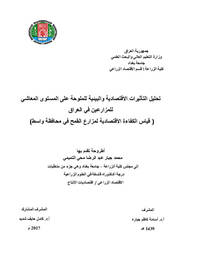Analysis of Economic and Environmental Impacts of Salinity on Livelihoods of Farmers in Iraq: An Examination of Economic Efficiency For Wheat Farms in Wasit Province

Authors:
The intensity and diversity of problems in the Iraqi agriculture sector have
been of enormous proportions and have made it very difficult for most farmers
to deal with the situation. At farm level, salinity has been a constraining factor
affecting agricultural productivity. In view of this context, and in addition to
previous studies, this paper specifically focuses on examining the impact of
salinity on agricultural productivity and total gross margin. That is, it is an
integrated analysis of the effect of salinity on agricultural productivity and
profitability of farms in salt-affected areas in Central Iraq.
In Iraq many study have been focusing on the relationship between
agricultural productivity and irrigation water salinity, but, from publication
stand point, the relationship between agricultural productivity and soil salinity
have been ignored. Analysis of the socioeconomic and policy constraints and
opportunities for the effective use and remediation of saline land and water
resources in central and southern Iraq at the basin, irrigation project, and farm
scales and to identify and measure their impacts.
The fact is that wheat farmers reach different levels of economic efficiency.
The hypothesis to be tested is whether soil and water salinity reduce the
economic efficiency of wheat farmers in the study area.
This study set out to investigate the impact of soil salinity on Economic
efficiency (EE) and environmental efficiency (En.E) in wheat production in
central Iraq, where 360 farmers interviewed in winter season 2015-2016. The
main objective of this study is to consider how farmers could reallocative their
resource in efficient and sustainable ways to produce viable agricultural
production in the salt-affected areas of Iraq without introducing a new
technology. Parametric approach employed to estimate a frontier of
production.
Stochastic frontier analysis (SFA) is proposed for estimates EE and En.E
in irrigated wheat production system with respect to soil electric conductivity
value. The results showed that, the mean level of EE was 60% for low.
